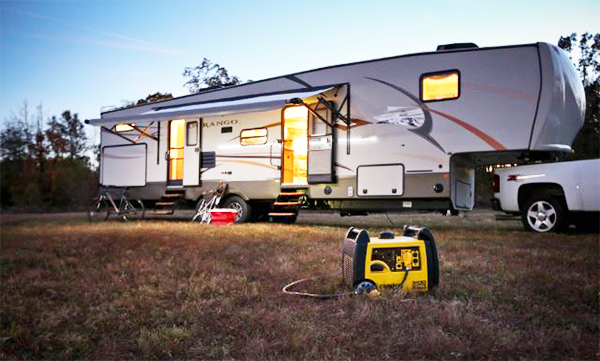Most people choose to have portable generators even if they have the most intricate solar panels on their rig. The reality is that even if you plan to use an air conditioner sparingly, you’ll need one. If you plan to go boondocking, you’ll most definitely rely on one at some point. If you’re not camping at a site with electrical hookups, there are other appliances too that will most likely need the generator (your hairdryer, for one, or a battery charger). Since ACs tend to suck up the most energy, begin by asking yourself how often you use one when you travel. As for how big a generator you’ll need, that all depends on you and your energy consumption.
One thing to keep in mind is that starting up your air conditioner uses more energy than running it, often twice as much. You have more leeway in trying to run other appliances after your AC is up and running. Otherwise, you risk shorting a fuse.
Many RVers prefer to have an RV class generator but for others a portable generator is the more affordable option.

Know Your Wattage
If you hate math, you’re going to have to suck it up and deal with it because unless you want to buy an unnecessarily big, expensive and loud generator, you’re going to have to do some accounting for the amount of energy you use. You use electricity in many ways, ranging from making coffee and working behind your laptop to using your electric counter-top grill.
Keep in mind that a generator with too much wattage will consume too much fuel, and your neighbors will hate you for all that noise. Also the larger the generator, the more it will weigh, making it harder to get the generator in and out of your vehicle. You also have the option of buying more than one generator and linking them together for more wattage. Moving two lightweight generators is always easier than moving one monstrous one.
Most generators range from 2000 watts to 6500 watts and range in price from $1800 dollars to $4,000+.
Let’s say your air conditioner is 13,500 btu. The wattage to start it is about 3000 watts and anywhere between 1500-2000 watts to keep it running. If you have a more powerful air conditioner, say 15,000 btu, then the starting wattage can be as high as 3,500 watts and to run it, you’ll use as much as 1800 watts. Remember, your air conditioner is not the only energy sucking appliance you have. Your microwave, for instance, will use 1,000 watts to start and another 1,000 watts to run.
Basically, it’s a bad idea to run several appliances at once, even if you have a powerful generator. After you do the math of your energy usage, you’ll have a better idea which appliances you can run at the same time.

Select Your Fuel
RV generators aren’t all the same. They come in different styles based on what kind of fuel they require. Make sure to select one that’s compatible with your RV. If you’re unsure, speak with the dealer or previous owner of your rig. Also, make sure the generator you plan to buy will fit in the generator compartment of your RV; Take careful measurements and measure twice to make sure the size is correct. You’ll thank yourself later.
Generators are fueled by three types of fuel:
- Diesel
- Propane
- Gas
Most people don’t choose an RV based on the generator but the other way around. However, in general, diesel runs cleaner than gasoline and produces more power than propane. It’s also non-explosive. Meanwhile, propane is a more environmentally friendly fuel but power is limited to the size of the propane tank. Gas is least expensive, though highly flammable, and has a shorter shelf life than the others.
Is Your Generator Covered by Insurance?

Your RV is an investment so make sure you have it and everything in it protected. A good insurance plan will cover many things including special equipment for your rig. Speak with an Insurance Specialist about all the equipment (generator included) that you want insurance to cover (866-501-7335). While you’re at it, get several quotes to see if you can get a lower premium rate than the one you’re getting now.
The information in this article was obtained from various sources. This content is offered for educational purposes only and does not represent contractual agreements, nor is it intended to replace manuals or instructions provided by the manufacturer or the advice of a qualified professional. The definitions, terms and coverage in a given policy may be different than those suggested here and such policy will be governed by the language contained therein. No warranty or appropriateness for a specific purpose is expressed or implied.
